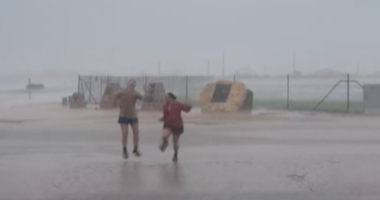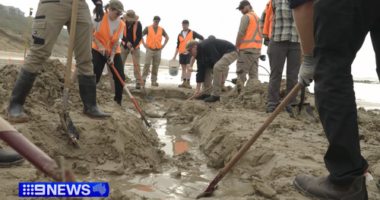Share this @internewscast.com
Incidents leading to fatalities during safari excursions have become increasingly frequent, with several tragic events recorded over the past year and a half.
The latest tragedy struck in July 2025, when a sunrise safari walk in Zambia turned deadly for a British tourist and her New Zealand companion, both of whom fell victim to a charging elephant.
A year earlier in July 2024, a Spanish traveler met a horrific end in a South African game reserve. He was crushed by an enraged elephant herd after stepping out of his vehicle to snap photos, leaving his fiancée in shock.
Just two months prior to that incident, Lisa Manders, a 70-year-old from Connecticut, faced a tragic fate in Zambia. During a ‘bush walk’ as part of a dream safari with her husband Craig, she was attacked and killed by a hippo.
In April of the previous year, chaos erupted in a Zambian national park when a bull elephant, in a frenzied state, pursued a safari vehicle for over half a mile, ultimately resulting in the death of an American tourist.
Adding to the alarming trend, recent footage surfaced earlier this month from Botswana’s Okavango Delta, depicting a terrifying scene where an elephant overturned a safari canoe, nearly crushing a woman in the process.
In the past three months, even safari workers have faced with aggressive wildlife.
Last month, horrified tourists watched as a pack of lions ate a zookeeper alive, when he stepped out of his jeep in the open enclosure at Safari World in Bangkok, Thailand.

Lisa Manders, 70, was gruesomely killed by the hippo last year in Zambia on an African safari while her husband, Craig, stood on in horror


Minnesota resident Gail Mattson, 79, was killed by an elephant during a game drive in the Kafue National Park, Zimbabwe, last year

Last month, horrified tourists watched as a pack of lions ate a zookeeper alive, when he stepped out of his jeep in the open enclosure at Safari World in Bangkok, Thailand
And the multi-millionaire owner of one of South Africa’s top game reserves was horrifically trampled to death as he tried to move a group of elephants away from tourist lodges in July 2025.
It makes for difficult reading. But what’s causing this seeming surge in safari deaths?
Data collected by the United Nations World Tourism Organization shows Africa welcomed 74 million international tourists in 2024 – a 7 per cent increase from pre-pandemic levels in 2019 and up 12 per cent from 2023.
And this rapid growth in tourism has created somewhat of a problem in terms of oversaturation, says Wild Wings Safaris founder and director, Onne Vegter.
Speaking to the Daily Mail, he says: ‘African safaris have become extremely popular, and many top destinations are sold out months in advance.
‘This has led to a proliferation of many smaller operators, lodges, and even artificial safari parks or “game reserves”, closer to urban populations.
‘Some tourists unfortunately take shortcuts and book with less reputable operators, or choose cheaper options on the outskirts of recognised game reserves, where human-wildlife interaction is more prevalent and safari activities are perhaps more risky.’
Sarah Rodrigues, a travel expert working with Avanti Travel Insurance, agrees: ‘Safaris are tailoring their marketing to be more appealing for specific interests – not just “family friendly” but also ones incorporating conservation work or developing wildlife photography skills.

Wild Wings Safaris founder and director, Onne Vegter tells the Daily Mail: ‘African safaris have become extremely popular, and many top destinations are sold out months in advance. This has led to a proliferation of many smaller operators, lodges, and even artificial safari parks or “game reserves”, closer to urban populations’

Sarah Rodrigues, a travel expert working with Avanti Travel Insurance, agrees: ‘There’s also the fact that safari lodges have become increasingly luxurious and glamorous, which could potentially dull a visitor’s sense of danger’
‘There’s also the fact that safari lodges have become increasingly luxurious and glamorous, which could potentially dull a visitor’s sense of danger.
‘Social media likely plays a role too, by exposing people more regularly to the idea of what’s out there.’
Onne says social media has also meant that tourists are keen to get the best shot of the wild animals possible.
And he says several guides he has spoken to have reported ‘that tourists often put pressure on them to push the envelope for the sake of content’ during game drives and bush walks.
He says: ‘Unfortunately, more and more influencers and uninformed safari guests are pressuring their guides to push the boundaries and insist that they bring them closer to the animals, for the sake of social media content.
‘Too often, uninformed tourists are willing to take risks in order to get a viral video or a close up selfie with a wild animal – and this really only became a widespread problem thanks to the rise of social media.’
AI has even been blamed for these deaths, with fake videos of people cuddling up to lion cubs and posing with zebras going viral on TikTok and Instagram, and ‘muddying the waters’, and encouraging people to try and get closer to the wild animals.
Onne adds: ‘This lack of understanding about wild animals has resulted in several unnecessary and preventable incidents, and this is why a detailed safety briefing by a qualified guide at the start of every safari is so important.
‘When a tourist exits a vehicle or ignores instructions from their guide simply to try and get a close up photo of a wild animal, too often the wild animal or the safari guide gets the blame if something goes wrong. Or safaris are denounced as dangerous by default.
‘This is simply not true.
‘While there is always some risk involved (like every time you get into a car to drive somewhere), safari tourists who follow the instructions of their guide and maintain a safe distance from wild animals are extremely unlikely to have an unpleasant incident on safari.’
Sarah also believes population increase in Africa and climate change are having an impact on wildlife, making them increasingly agitated, and sometimes aggressive.
Sarah says: ‘Population increase in Africa has put increasing stress on wildlife habitats and heightened the potential for animal-human conflict.
‘Climate change also plays a role in this, with animals and humans in competition for natural resources, such as water.’

A huge and angry elephant comes storming out of the bushes and heads straight for their vehicle

It crashes through the undergrowth and charges towards them, its enormous ears and trunk flailing wildly
However, Onne says these fatal incidents shouldn’t put tourists off safari holidays completely, noting they’re rare.
He finishes: ‘While there has been a spike in recent reports of tourist deaths on safari, it’s worth keeping a few realities in mind.
For starters, while a handful of recent incidents have received plenty of media coverage, the number of deaths or injuries on safari is miniscule as a percentage of the millions of tourists who book an African safari every year. Statistically, it remains far more dangerous to drive a car, or go cycling, or go horse riding, for example.
‘Secondly, by far the majority of incidents occur in more populated areas where wildlife have been habituated or dangerous animals are regularly in conflict with humans. A case in point was the recent elephant attack on tourists in mekoror (dugout canoes) on the outskirts of the Okavango Delta.
This was not deep in a protected wilderness area, but on the outskirts of town where conflict between humans (local farmers) and elephants is common. Such elephants have been habituated to humans and have a deeper fear and dislike of humans, compared to wild elephants in more remote locations who do not get harassed by humans.
The same is true for lions and other animals that are raised or fed by humans. Animals in zoos or small enclosures like urban safari parks are far more dangerous than wild animals.
‘Wild animals do not associate humans with food, nor with their captivity. They are far more likely to run away from humans rather than to attack them. Habituated animals are dangerous.’













